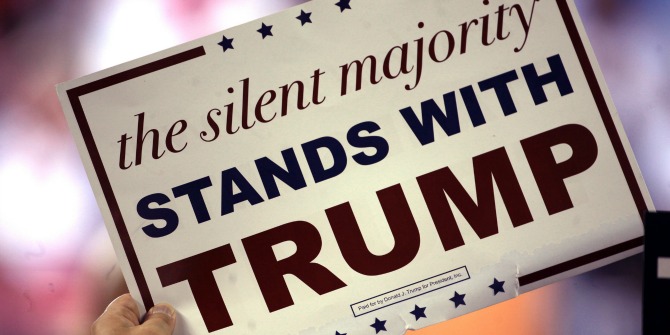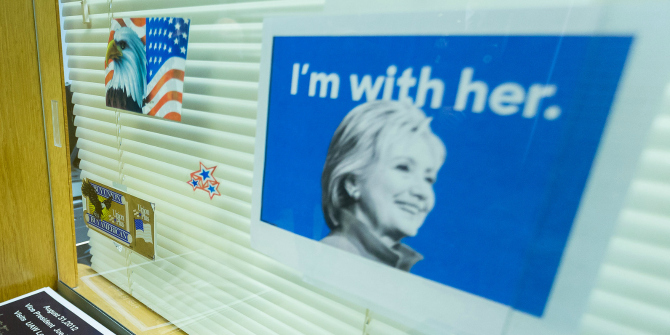Given Trump’s divisive rhetoric during the presidential election, many have expressed concern and fear about the course of international politics, American domestic affairs and US culture. Though acknowledging the serious danger to the status quo that President-Elect Trump poses, Terry Hathaway posits that we should be hopeful and not put too much stock in his campaign rhetoric; in addition, he notes that the promise of an (eventually) rejuvenated Democratic party should offer some solace.
The election of Donald Trump to the US Presidency was widely seen as unlikely, due, among many others things, to his rhetorical incoherence, his frequent attacks on minority groups, and his brittle ego. Yet Trump succeeded, due to a discourse of fixing American decline that was able to attract white working class voters in key Midwestern states, and due to widespread distrust of Clinton intermingling with highly partisan US politics. That, at least, is my one sentence post-mortem of the US election result.
The response around the world to Trump’s election has been largely negative and many individuals have expressed fear at Trump’s now-impending presidency. This fear is understandable as Trump represents a major departure from the status quo, with little sense of what the destination is apart from the current huge potential for various minority groups to face greater discrimination in Trump’s America. In light of this situation, I’ve put together three areas to watch (and perhaps be fearful of), and three reasons why President Trump may not be as bad as has been feared.
The first danger is international. The US is central to the current system of global governance that, while uneven, unfair and unwieldy, provides some degree of co-operation between countries and has several victories to its name. If Trump takes the US down an isolationist path, there could well be a crass wrecking of international order with nothing in its place. This issue is particularly important in terms of climate change, as with Trump as President US co-operation in climate change governance efforts looks severely imperilled. Trump’s rumoured pick for the Environment Protection Agency is Myron Ebell, of the Competitive Enterprise Institute (CEI). An example of the CEI’s view of climate change can be summed up in their infamous advert that finished with the tagline “CO2, they call it pollution, we call it life”. If the US starts to step back on creeping environment progress, and in other areas, we are in for an interesting time on the international level.
The second danger is domestic. One of President Trump’s first tasks will be to appoint a new Supreme Court justice, which should be relatively easy with the Republicans now holding the Presidency, the House and the Senate by the largest majority since 1928. His appointment will almost certainly return the Court to its 5-4 pro-Republican split, but he could also move to specifically appease evangelical voters, who (during the Republican primaries) he sought to court with a list of eleven (white and conservative) judges who he would consider for the open Supreme Court position. Moreover, further positions in the Supreme Court could, unfortunately, open with two liberal justices – Ruth Bader Ginsburg, 83, and Stephen Breyer, 78 – not being in the first springs of youth. Such moves could fundamentally reopen discussion in areas such as gay rights and abortion, and alter the balance of the Supreme Court decisively in favour of the Republicans, and social conservatives, for a very long time.
The final danger is wider and related to the discursive environment. The election of someone who has so often vilified, attacked, and incited violence against “others” has opened up space for groups much more hostile to tolerant values than Trump necessarily is. Like Brexit gave oxygen to intolerant groups – with homophobic attacks, for instance, showing a 147% increase following Brexit – so too could the success of Trump. The KKK’s newspaper, The Crusader, endorsed Trump pre-election, and Trump is broadly positively seen by various US neo-Nazi groups. There is certainly a worry that such groups could return to the US mainstream and roll back social progress achieved over the last fifty years. Equally, with global communication so easy, such an effect could be felt around the world.
Yet, beyond these dangers, my first nugget of solace comes from the fact that while Trump may lack some of the personal attributes that are perhaps desirable in a leader, President Trump will, and any President does, not rule alone. JFK famously had his “brain trust” group of advisors, and any President – while ultimately sitting where the buck stops – is surrounded by various people who will seek to advise and manage the President (think Sir. Humphrey). It is perhaps a hopeful sign that Trump’s aides reportedly managed to take control of Trump’s Twitter account in order to keep the candidate on message pre-election. At this point, how Trump will act as President is unknown, and his advisors may well play a crucial role in shaping President Trump into being a President who affords some very basic level of respect to different groups within society. That Trump seems to opportunistically espouse different political values, rather than sticking to hard principles, suggests he has the potential to be very mouldable.
My second ray of hope comes in the fact that the Republicans are not united. Trump’s divisive rhetoric was, unsurprisingly, divisive. Simple party lines are not sufficient to understand the complex political waters that President Trump will need to navigate. His path to the Presidency involved various acrimonious spats with other Republicans and there is a longstanding tension between Trump and the Republican National Committee. Such a situation plays in to the checks and balances of the US system, and we could see (should Trump push towards enacting the worst of his rhetoric) bipartisan resistance formed from a section of the Republicans joining the Democrats, or even outright Republican resistance to a Republican President (a scene which may feel familiar to followers of contemporary British politics).
The final reason for, if not optimism, a reduction in despair, is that Trump’s victory does not necessarily represent a sea change in US politics, and mid-term elections are only two years away. Instead of a sea change, Trump’s electoral coalition is not cohesive, nor is it coherent. How Trump juggles the diverse demands of Evangelical Christians, the disaffected working class, and aging Reaganites is uncertain – if not, in fact, impossible. Moreover, Trump’s election was also somewhat based on facing a flawed and politically-tainted opponent, as seen by the fact that the drop in turnout from the previous election seems to have come entirely from absent Democratic voters. The Democrats can well re-energise from this defeat, whereas Trump’s cobbled together insurgent coalition will demand results and will no longer be able to paint itself in the colours of being anti-establishment.
Overall, Trump’s election is worrying; there is no denying that President Trump represents a threat to stability and to tolerant politics. But, while times are dark, the election result does not represent the emergence of a fascistic monolith. Trump’s divisive rhetoric may prove, in office, to have been simply rhetoric, or he could be constrained by either calmer heads within his party or the contradictions of his cobbled-together support. So, take heart. The world has not yet ended and all things – fair or foul – must come to pass.
Featured image credit: Thomas Hawk (Flickr, CC-BY-NC-2.0)
Please read our comments policy before commenting.
Note: This article gives the views of the author, and not the position of USApp– American Politics and Policy, nor of the London School of Economics.
Shortened URL for this post: http://bit.ly/2fIBQr3
______________________
About the author
 Terry Hathaway – University of Leeds
Terry Hathaway – University of Leeds
Terry Hathaway completed his PhD on Corporate Power and US Oil Dependence in September 2013 at the University of Leeds and has since held temporary posts at the Universities of Leeds, Salford and, currently, Sheffield. He tweets @terry_hathaway






